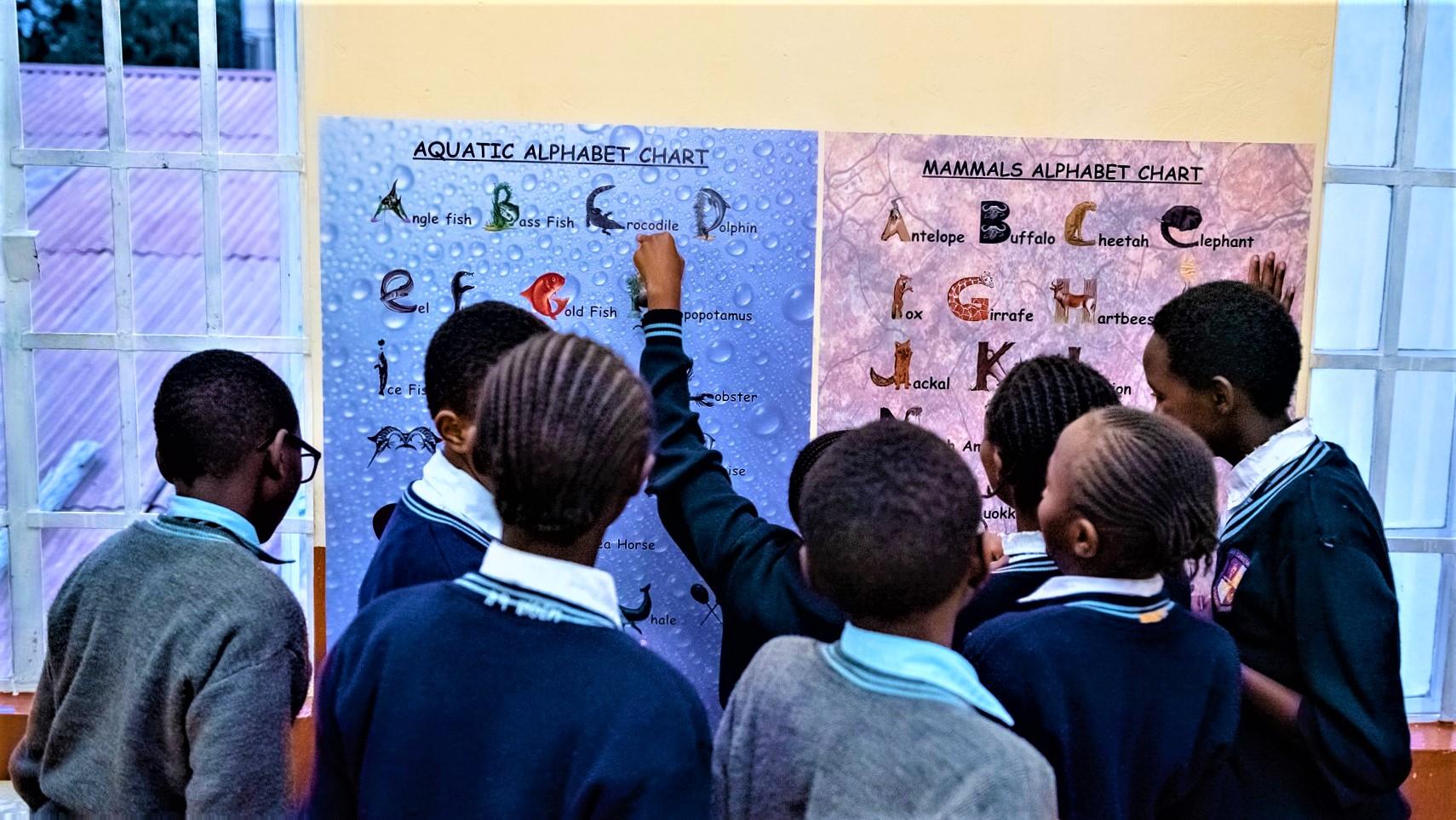
Project completed June 2024
Project Summary
Conservation education outreach remains one of the most effective ways to reach students and communities. In the past year, the 'Elimisha' conservation education outreach project was implemented in Central and Southern Kenya to address the knowledge gap on the impacts of climate change. The Laikipian implemented the project using a climate change awareness board game 'Nexus Dicey' to reach over 20,000 students and community members. To achieve this milestone, they engaged four other partners to conduct awareness outreaches to academic institutions, thematic conferences and outdoor events.
The official partners were Ol Pejeta Conservancy, Mount Kenya Trust, Tony Wild and South Rift Association of Land Owners (SORALO). One of the original partners, Mount Kenya Wildlife Conservancy discontinued due to changes in their programme and renovations at their resource centre. We onboarded SORALO soon after. However, as the project gained traction, we onboarded five other partners who were interested in our approach. These include Borana Conservancy, Laikipia Wildlife Forum, The Leo project, Born free and the Mara Meru Cheetah project among others. Each of the partners runs a successful conservation education programme in their locality which maximised the access to the schools and trainers.
The board game is designed to immerse the student in a world where negative climate impacts have immediate consequences and each positive mitigation activity has a reward. It challenges the students to take action and take part in collective activity to protect our environment. Students got a chance to engage in different activities like tree planting and nature photo raising climate change awareness and undertaking practical activities to protect and guard their immediate environment and livelihoods.
Activities
Key activities of the project included:
1. Game Preparation and Printing: The Laikipian team collaborated with a professional designer to incorporate feedback gathered from various educators' forums. The objective was to refine the game to ensure it is both educationally effective, engaging and aligned with the current competency-based curriculum.
2. Manual Development and Pawns Design: A comprehensive manual and pawns were developed to guide educators on effectively using the climate awareness board game. The manual offers detailed information on the topics covered within the game, empowering educators with the necessary information to facilitate productive discussions with different audiences. Additionally, the Laikipian team sourced a reputable print house to produce 200 copies specifically formatted to be user-friendly in a classroom setting. The team engaged designers to create unique pawns, sourced wooden dice, and developed attractive packaging for the board game.
3. Partners Onboarding: The project successfully engaged with four partners. Each partner formalised their commitment by signing an agreement outlining their roles and responsibilities within the project. One of the main partners Mount Kenya Wildlife Conservancies dropped out amicably, quoting renovations and changes in their programme. We onboarded a new partner in the South Rift who luckily managed to implement the project within our timeline. The new partner is South Rift Association of Land Owners.
4. Training of Trainers: We organised two training of trainer's sessions in Nanyuki and the South Rift. 13 educators were in June 2023, and another 17, trained in the South Rift. In total we trained 30 trainers, from the partner organisations and some teachers who were responsible for training the teachers in schools.
5. Games Distribution and Follow-up: The goal was to reach out to 100 schools and these allocations were as follows: Ol Pejeta Conservancy 50 schools, Mount Kenya Trust 30, Tony Wild 10 schools, and South Rift Association of Land Owners 10 schools. In addition to the in-class board games, all partners were also provided with a canvas life-size portable version of the game for training purposes and for outreach to schools that may not have immediate access to the physical board game.
Impacts
1. Increased Understanding: There was a marked improvement in the comprehension of climate change impacts amongst participants.
2. Ongoing Commitment: Teachers and students alike demonstrated a strong commitment to continually engage in environmentally friendly activities.
3. Role Awareness: Participants expressed a keen desire to continually learn about and understand their role in protecting their immediate environment.
4. Enhanced Engagement: There was a noticeable increase in participation in environmental clubs within schools.
5. Collaboration Interest: The project triggered interest among participants to approach other organisations for potential collaborations on environmental initiatives.
Outcomes and legacy
1. Enhanced Teaching Capability: By using the game, teachers were able to effectively illustrate the comprehensive climate change picture, which was previously challenging without visual aids.
2. Overcoming Resource Limitations: Due to minimal resources, teaching aids are scarce in schools. However, this project provided students with copies of the game in their schools, allowing them to revisit and reinforce their learning repeatedly.
3. Versatile Learning Tool: The game has emerged as a versatile tool suitable for both indoor and outdoor learning environments. This flexibility enhances its utility and impact.
4. Community-wide Impact: The game serves as an educational resource not only for students but also for the wider community, fostering a broader understanding of climate change impacts.
5. Empowerment for Action: Perhaps most importantly, the game helps students and community members understand how they can be part of the solution to climate change.
The enduring legacy of this project is the creation and distribution of an accessible, engaging tool that empowers both students and the community to comprehend climate change impacts and take meaningful action. This legacy underscores the project's potential for long-term positive influence on environmental awareness and action in the region.
Recommendations
Based on recent experiences in Kenya, including responses to devastating floods and engagement at national events, it is clear that improved preparedness and resources are critical for addressing climate change impacts. The one-stop climate information tool provided received positive feedback from educators, though affordability remains a challenge for wider implementation. Key recommendations include: providing access to relevant, current conservation education materials; creating more spaces for youth dialogue and engagement; fostering collaboration between organisations to amplify impact and reduce duplication of efforts; and allocating resources to facilitate outreach activities in academic institutions. These steps are essential for enhancing climate change awareness and response capabilities across Kenya.
Follow up
As the project progresses, several follow-up activities are planned or underway to ensure its continued impact and expansion:
1. Ongoing Partner Support: We will continue to provide support to our partners, with a particular focus on training. Our commitment to collaboration extends beyond the initial project timeframe.
2. Curriculum Integration: We are working towards getting the board game approved by the Kenya Institute of Curriculum Development. The goal is to have the game mainstreamed in the national curriculum.
3. Regional Expansion: We are engaging with partners in other regions of the country who have similar programmes, aiming to extend the project's reach and impact.
4. Government Collaboration: We are working with relevant ministries to integrate the game into their programmes, specifically targeting WCK and NEMA education programmes.
5. Supplementary Materials Development: New materials for climate awareness are being developed to complement the game. A climate alphabet is nearly complete and will accompany the game as an additional educational resource.
Project team profiles
|
Mercy Waithira (2021-22) Project lead Mercy is a Wildlife Ecologist, Conservation educator and an independent conservation researcher based in Kenya. She is a Co-director at The Laikipian, an Art for Conservation enterprise that is focused on conservation education and developing relevant content for conservation and climate change awareness. Previously, Mercy has managed projects focusing endangered species protection, habitat restoration and management, and socio ecological resilience programmes. She is a Conservation Leadership programme alumni and has worked for Zoological Society of London, Ol Pejeta Conservancy and Birdlife International Africa Secretariat. |
External contributors
| Antony Ochieng | Director, Tony Wild LTD |
| Ian Mungai | Deputy Manager, Community department, Ol Pejeta Conservancy |
| Edwin Kinyanjui | Conservation Education Officer, Mount Kenya Trust |

